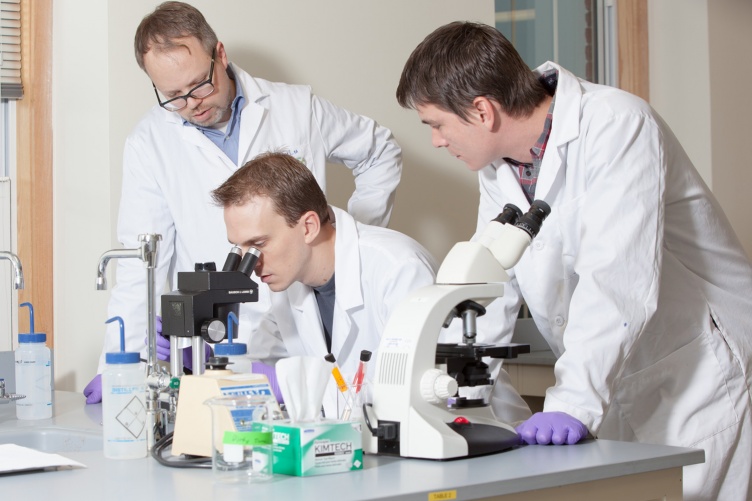
Biology Professor Kyle MacLea, left, conducts research in the microbiology lab with biological sciences students Scott Mithoefer, center, and Bruce Rheaume, right.
Biological sciences students Bruce Rheaume and Scott Mithoefer recently had their genomic research on deep-sea bacteria published in Genome Announcements, a peer-reviewed journal of the American Society for Microbiology.
Their two published studies examined Idiomarina abyssalis and Idiomarina zobelli, organisms that were both isolated from deep in the Pacific Ocean. Rheaume, a graduating senior in the biological sciences program, says the project was developed from shared interest and guidance by his faculty mentor, Kyle MacLea.
“Once I told Dr. MacLea about my interest in genomics, he said he had been contemplating these sorts of genome projects,” Rheaume says. “He got me interested in the subject, so I started researching it, put together a feasible outline for us and just went from there.”
MacLea, assistant professor of biology at UNH Manchester, said they were able to get the bacteria for their research from a microbiology culture collection called ATCC. Rheaume and Mithoefer observed their growth in the microbiology lab on campus.
“Idiomarina abyssalis was actually identified back in the early 1980s, but scientists had only found and analyzed a small segment of its DNA, so they didn’t have much genetic material from it,” MacLea says. “We did a reexamination of the things they had looked at and things they hadn’t looked at.”
The team isolated a bunch of the DNA from both cultures and sent it to UNH’s Hubbard Center for Genome Studies on the Durham campus to be sequenced. MacLea says the research on each species was published individually, but the group is now working on a comparative paper about the two genomes.
“The catalog of genes shows they have a lot of similarities, but there are definitely some big differences too,” MacLea says. “At this point we're actually poised to write another paper comparing the two genomes using some additional computer analysis.”
Mithoefer, who began working towards his master of physician assistant studies (MPAS) at MCPHS University in January, says this is the first time he’s had work published — and it’s quite an accomplishment for he and Rheaume.
“It’s pretty awesome, because getting research published as an undergraduate, from what I understand, is pretty unheard of across the country,” Mithoefer says. “Usually master's or Ph.D. students are the ones getting their work published.”
An alumnus of Merrimack High School, Mithoefer graduated from UMass Lowell in 2006 with a degree in computer engineering before serving in the military for five years. After doing computer analytics for a private firm, he decided his real passion lies in the medical field. Once he gets his MPAS, Mithoefer hopes to conduct Ph.D. work researching genetics and medical technology.
“As a P.A., ideally I’d like to practice medically and also do research on the side to help with any diseases or treatments that might be coming down the road,” Mithoefer says.
“This project has been incredibly helpful in learning different lab techniques, designing a testable hypothesis and just being really methodical.”
Rheaume has similar career goals, hoping to be both a clinician and researcher. While he has always been interested in science, Rheaume spent a decade working as a journeyman plumber before deciding to pursue medicine. The genomic research project, he says, has helped prepare him for the work he’ll be do at the University of Connecticut, where he will begin working toward dual M.D./Ph.D. degrees this fall.
“Overall, going for a Ph.D., I am going to have to think like a scientist and, it’s a total learning curve,” Rheaume says. “This project has been incredibly helpful in learning different lab techniques, designing a testable hypothesis and just being really methodical.”
Mithoefer agrees, saying the lab experience and faculty involvement at UNH Manchester is unique from what you find at most research universities.
“At bigger universities it’s so competitive to get into a class that does research, let alone work with a professor one-on-one,” Mithoefer says. “This opportunity has definitely benefited me in the long term, career-wise.”
MacLea says his goal for his students is to design their own experiments and research around their interests. While most biology programs have subject-focused, faculty-directed projects, he wants students to pursue projects that reflect their individual career goals and scientific curiosity.
“This idea of experiential learning and learning hands-on with a project of your own design is incredibly valuable,” MacLea says. “It’s a good opportunity for students to explore things that they are interested in, while preparing them for graduate school in a very independent way that they might not get otherwise.”
-
Written By:
Kassidy Taylor | Marketing & Communications, UNH Manchester | kassidy.taylor@unh.edu
















































